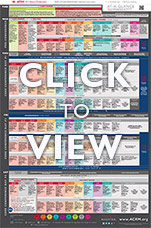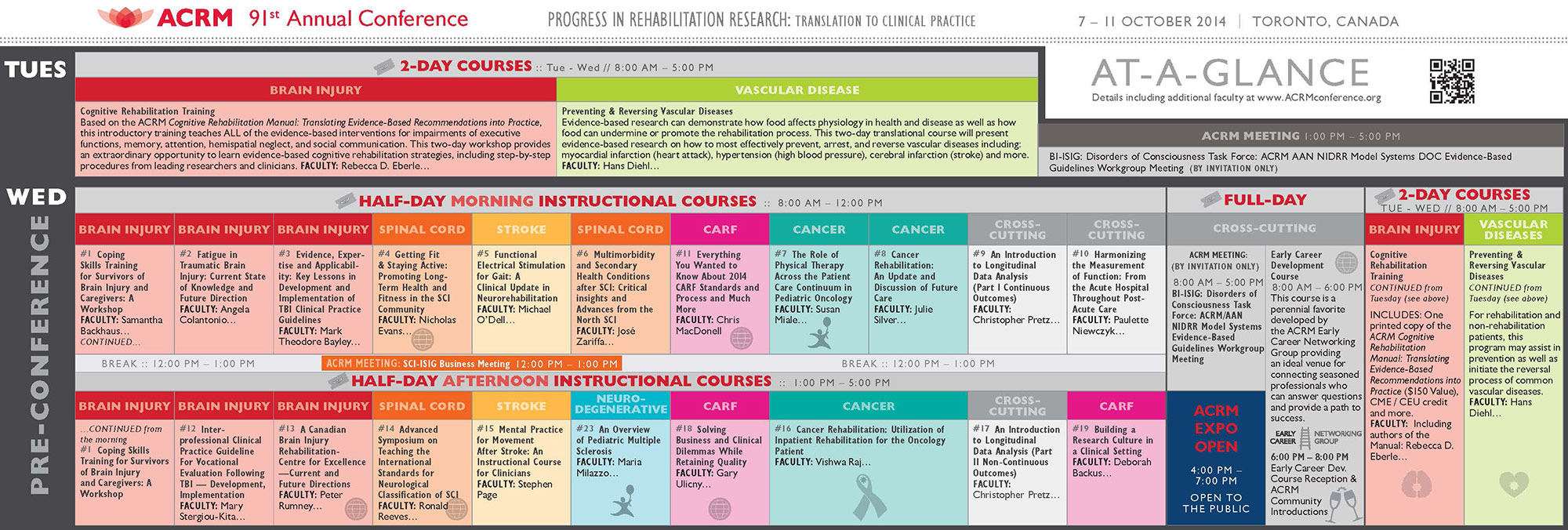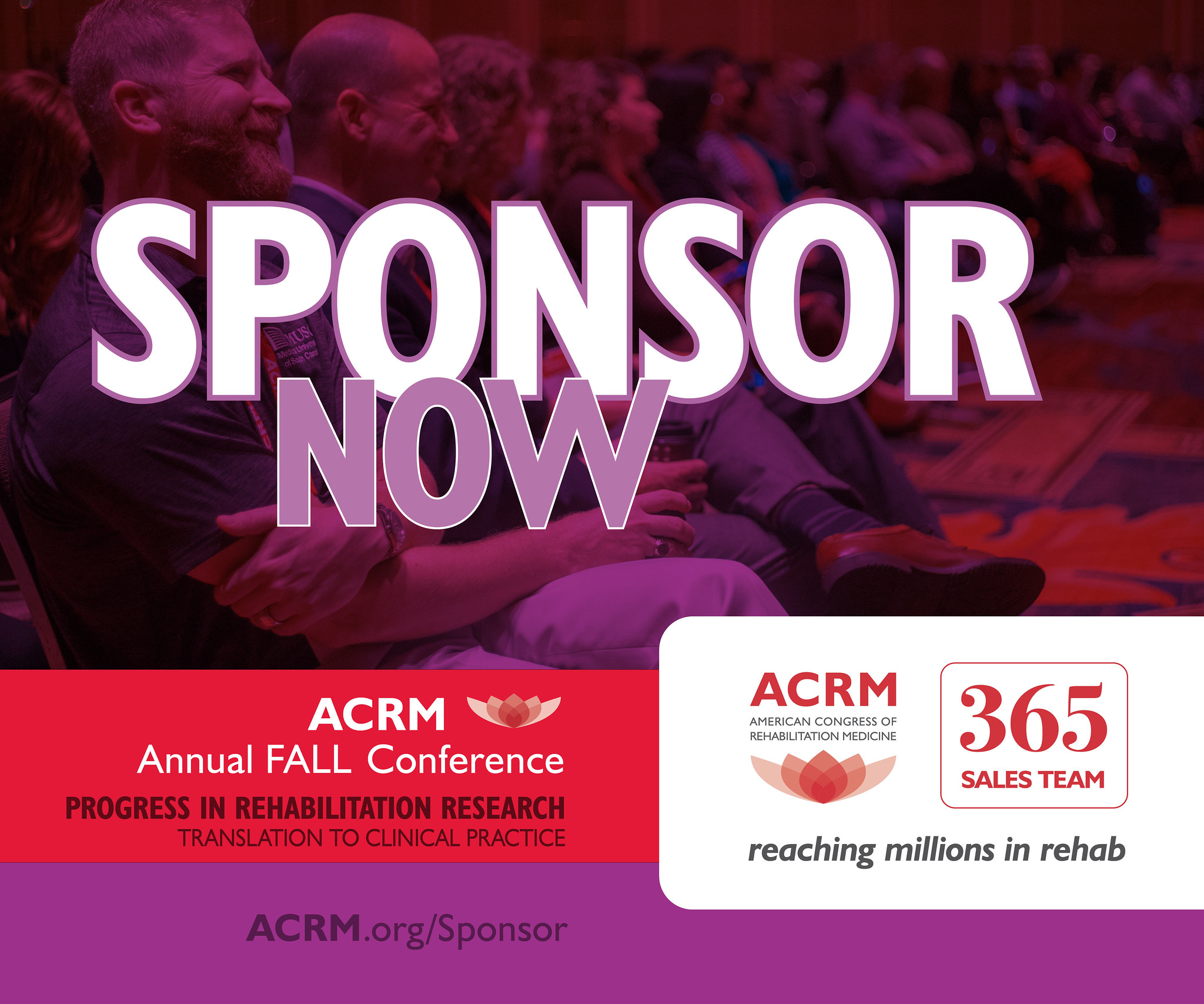Annual Conference Content for Brain Injury
 In addition to the many cross-cutting symposia, featured plenaries, and lectures relevant to multiple diagnostics and practice areas, the ACRM 91st Annual Conference offers a full track of NONSTOP educational content for BRAIN INJURY.
In addition to the many cross-cutting symposia, featured plenaries, and lectures relevant to multiple diagnostics and practice areas, the ACRM 91st Annual Conference offers a full track of NONSTOP educational content for BRAIN INJURY.
2-Day Cognitive Rehabilitation Training
Instructional Courses for Brain Injury
Core Conference Symposia for Brain Injury
BI-ISIG Meetings
See RED Brain Injury Content in the Program At-A-Glance >>>
ACRM 91st Annual Conference, Progress in Rehabilitation Research
7 — 11 October 2014
InterContinental, Toronto Centre and the Metro Toronto Convention Centre
Toronto, ON, Canada
![]()
[sm_hr]
IN-DEPTH INSTRUCTIONAL COURSES
Choose between 23 half-day courses and dig deep into special interest areas. CME/CEU credits included in your choice of 11 disciplines. The more you attend, the more you save! Perfect also for busy, local professionals, patients, and caregivers who need to know about the latest rehabilitation research informing clinical practice, but cannot attend the full conference.
FOUR INSTRUCTIONAL COURSES FOR BRAIN INJURY
WEDNESDAY // 8 OCTOBER
- #1 Coping Skills Training for Survivors of Brain Injury and Caregivers: A Workshop (#1054)
NOTE: This is a full-day course requiring registration for TWO instructional courses - #2 Fatigue in Traumatic Brain Injury: Current State of Knowledge and Future Direction (#1049)
- #3 Evidence, Expertise and Applicability: Key Lessons in Development and Implementation of TBI Clinical Practice Guidelines (#1073)
SATURDAY // 11 OCTOBER
SEE Descriptions for All 23 Instructional Courses
[sm_hr]
CORE CONFERENCE SYMPOSIA FOR BRAIN INJURY
With a strong interdisciplinary focus, the 91st Annual Conference Program offers more than 100 symposia in 7 tracks, plus dozens of cross-cutting symposia relevant to multiple diagnoses. It’s the ONE conference for the WHOLE rehabilitation TEAM.
THURSDAY // 9 OCTOBER
- Interventions Affecting Outcomes Following Traumatic Brain Injury Rehabilitation (#1152)
- Long-Term Social Role Difficulties for the Person With a Brain Injury and a Psychiatric Diagnosis (#1139)
- Pediatric Concussion: Who, What, When, Where, and Why (#1142)
- Oral Presentation of Scientific Papers — Brain Injury Topics
- Sheldon Berrol Memorial Chautauqua: A Call To Action For Health Disparities
- Minimal Competency Guidelines for Rehabilitation of Persons With Disorders of Consciousness (#1103)
- Aging and Long-Term Issues Following Traumatic Brain Injury (#1102)
- Brain Injury Before Age 5: Implications for Rehabilitation (#1155)
FRIDAY // 10 OCTOBER
- Identifying the Active Ingredients and Outcomes of Discipline Specific Therapy in Traumatic Brain Injury Rehabilitation (#1247)
- Methodological Issues in Mild Traumatic Brain Injury Research: A Workshop (#1263)
- Conceptual Framework for the Study of Sleep Disturbance Following Acute Neurologic Injury (#1126)
- Concussion and Students: An Inter-Professional Approach to Concussion Management (#1214)
- Evidence-Based Management of Secondary Conditions in Traumatic Brain Injury Inpatient Rehabilitation (#1145)
- Pharmacotherapy of Post-Traumatic Cognitive Impairments: Investigations of Acetylcholinergic and Catecholaminergic Approaches (#1287)
- Bridging the Gaps Between Medical Rehab and Schools for Students With Acquired Brain Injuries (#1099)
- Longitudinal Outcome Models in Traumatic Brain Injury and Spinal Cord Injury: From Research to Practice (#1107)
- Best Practices in Concussion Management: Evidence for Rest, Exercise and Vestibular, Cognitive, and Emotional Rehabilitation (#1200)
- Representation in the TBI Model Systems: Reflections From an Urban Model System (#1278)
- Traumatic Brain Injury: Recovery and Decline (#1269)
- School-Based Programs Promoting Symptom Resolution and Recovery for Concussion: REAP and BrainSTEPS CMT Models (#1122)
SATURDAY // 11 OCTOBER
- Serving People With TBI and Addiction: Collaboration, Symbiosis Or Denial? (#1137)
- What is Unique About Military and Veteran Rehabilitation After Brain Injury? (#1184)
- An Interdisciplinary Clinical Practice Guideline for Concussion Management: Translating Evidence Into Practice (#1207)
- Sex Differences in Comorbidities After Neurotrauma: Implications for Rehabilitation (#1256)
- Interprofessional Development to Support the Transition of Students With TBI From Postsecondary Education to Employment (#1242)
- Neurosexuality: Neurobehavioral Approaches to the Study of Sexuality After Traumatic Brain Injury (#1135)
- Innovative Assessments and Treatments in Cognitive Rehabilitation (#1185)
See Descriptions of All Symposia
[sm_hr]
ACRM COMMUNITIES MEETINGS
ACRM supports 13 interdisciplinary communities of rehabilitation professionals focused on a specific diagnostic or practice area. These groups are the lifeblood of ACRM and provide members opportunities for collaboration, recognition, publishing, networking, and much more. Many of these groups will meet during the annual conference and welcome new members.
See All ACRM Community Group Meetings
ACRM Membership Meeting
FRI // 10 October, 5:45 PM – 6:30 PM
New to ACRM? The annual Membership Meeting is a great opportunity to learn more about the important work of ACRM, meet the leadership, and discover ways your participation can make an impact. All attendees are encouraged to attend.
BI-ISIG MEETINGS
What better time to connect with colleagues who share your interests than during the annual conference! The Brain Injury Interdisciplinary Special Interest Group (BI-ISIG) invites your participation. Please note that due to the current stage of existing projects, some task force meetings are closed to new members.
WED // 8 October
- BI-ISIG: DOC Task Force Meeting: ACRM/AAN NIDRR Model Systems, Evidence-Based Guidelines Group (by invitation): 8:00 AM – 12:00 PM and 1:00 PM – 5:00 PM
THU // 9 October
- BI-ISIG Annual Summit: 12:30 PM – 1:45 PM
- BI-ISIG: Cognitive Rehabilitation Task Force Meeting: 4:00 PM – 5:30 PM
FRI // 10 October
- BI-ISIG: Prognosis after TBI Task Force Meeting: 7:00 AM – 8:00 AM
- BI-ISIG: Pediatric Adolescent Task Force Meeting: 7:00 AM – 8:00 AM
- BI-ISIG: DOC Task Force General Meeting: 7:00 AM – 8:00 AM
- BI-ISIG Girls and Women With ABI Task Force Meeting: 12:30 PM – 1:45 PM
- BI-ISIG: Disorders of Consciousness Task Force: Minimal Competency Guidelines for Rehabilitation of DOC Work Group Meeting (by invitation): 12:30 PM – 2:00 PM
- BI-ISIG Long-Term Issues Task Force Meeting: 12:30 PM – 1:45 PM
SAT // 11 October
- BI-ISIG: DOC Task Force Acute Confusion Case Definition Working Meeting (by invitation): 7:00 AM – 8:30 AM
- BI-ISIG Task Force Chairs Meeting (by invitation): 12:45 PM – 1:45 PM











